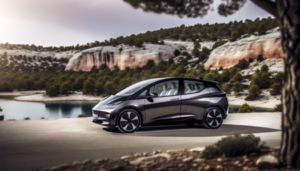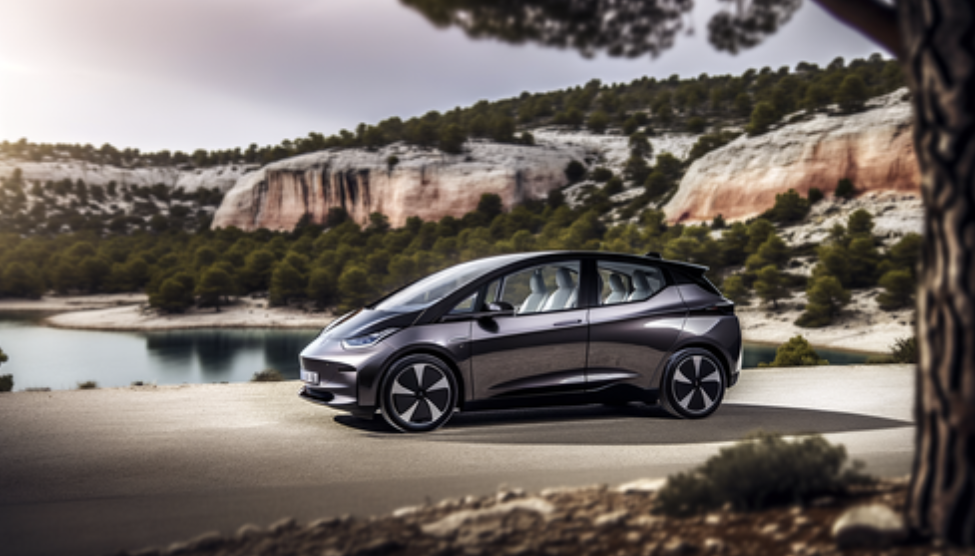Are you curious about the evolution of transportation? From the days of horse-drawn carriages to the rise of electric vehicles, the driving experience has undergone a remarkable transformation. And technology has played a key role in this evolution. Today, we’re at a new pinnacle.
On a recent episode of Experts of Experience, Eric Wood, Vice President of Product Experience at Rivian, discussed the future of EVs and software-defined vehicles, emphasizing the need for seamless integration and personalized experiences. He also dug into the importance of collaboration and empathy in design and he highlighted the significance of customer-centric leadership and building brands that deliver on promises.

Table of Contents
The Evolution of Driving: From Horse-Drawn to Electric Vehicles
The way we travel and transport goods has come a long way since the days of horse-drawn carriages. With the advent of electric vehicles, we are witnessing a significant evolution in the driving experience. Electric vehicles, or EVs, have revolutionized the automotive industry with their eco-friendly and efficient technology. This shift toward electric transportation is not only driven by the need to reduce carbon emissions but also by the desire for a more sustainable and cost-effective mode of transportation.
The Impact of Innovative Technology on the Automotive Industry
Innovative technology has had a profound impact on the automotive industry, transforming the way we drive and interact with our vehicles. From advanced driver assistance systems to autonomous driving capabilities, technology has made driving safer, more efficient, and more enjoyable. With the integration of artificial intelligence and machine learning, vehicles can now analyze data in real-time to optimize performance and provide personalized experiences for drivers. This constant innovation in the automotive sector is driving the evolution of the driving experience.
Electric Vehicles: Leading the Charge in the Future of Transportation
Electric vehicles are leading the charge in shaping the future of transportation. With their zero-emission technology, EVs offer a cleaner and greener alternative to traditional combustion engine vehicles. As governments and consumers increasingly prioritize sustainability, the demand for electric vehicles is on the rise. The advancements in battery technology have also significantly improved the range and charging capabilities of EVs, making them a viable option for long-distance travel. With the continuous development of infrastructure and the increasing availability of charging stations, electric vehicles are becoming a mainstream choice for drivers around the world.
Understanding the Digital Experience in Modern Vehicles
Modern vehicles are not just modes of transportation; they are also digital hubs on wheels. The digital experience in vehicles has become an essential part of the driving experience. From touchscreen displays and voice-activated controls to connected services and smartphone integration, technology has transformed the way we interact with our vehicles. Drivers now have access to a wide range of features and services, including navigation systems, entertainment options, and real-time vehicle diagnostics. The integration of digital innovations has not only enhanced convenience but also improved safety and connectivity on the road.
Designing with the user in mind is key here. But Wood says you have to go beyond what today’s drivers are asking for.
“I see my job as a designer to deliver things that people could not have imagined themselves,” Wood said. ” Henry Ford famously said, ‘If I gave people what they wanted, they would have asked for a faster horse and carriage.’
“There’s a lot of things that people live with and they don’t realize they need a better version. I want to deliver an experience that is completely seamless.”
Electric Trucks: Pioneering Efficiency in Heavy Transportation
Electric trucks are revolutionizing the heavy transportation industry by pioneering efficiency and sustainability. With their electric powertrain, these trucks offer significant advantages over traditional diesel trucks. Electric trucks produce zero tailpipe emissions, reducing air pollution and improving air quality in urban areas. They also have lower operating costs due to the lower cost of electricity compared to diesel fuel. Additionally, electric trucks have the potential to reduce noise pollution, making them ideal for urban delivery operations. The adoption of electric trucks is not only beneficial for the environment but also for businesses looking to reduce their carbon footprint and operational costs.
Navigating the Electric Vehicle Market: Trends and Predictions
The electric vehicle market is experiencing rapid growth and transformation. As more automakers invest in electric vehicle technology, the market is becoming increasingly competitive. One of the key trends in the electric vehicle market is the expansion of charging infrastructure. Governments and private companies are investing in the development of charging stations to support the growing number of electric vehicles on the road. Another trend is the advancement of battery technology, which is improving the range and charging speed of electric vehicles. Additionally, there is a shift towards more affordable electric vehicles, making them accessible to a wider range of consumers. With these trends, the future of the electric vehicle market looks promising.
The Role of Electric Vehicles in Shaping the Future of Transportation
Electric vehicles play a crucial role in shaping the future of transportation. As the world strives to reduce greenhouse gas emissions and combat climate change, the adoption of electric vehicles is a significant step towards achieving these goals. By replacing traditional combustion engine vehicles with electric vehicles, we can significantly reduce carbon emissions and improve air quality. Electric vehicles also offer the potential for renewable energy integration, as they can be charged using electricity generated from clean sources such as solar and wind. Furthermore, the development of smart grid technologies can enable vehicle-to-grid integration, allowing electric vehicles to contribute to the stability and efficiency of the electrical grid. With their environmental benefits and technological advancements, electric vehicles are paving the way for a sustainable and efficient transportation system.
Innovative Technologies Driving Change in the Automotive Sector
Innovative technologies are driving significant changes in the automotive sector. From advanced driver assistance systems to connected car technologies, these innovations are reshaping the way we interact with vehicles and the overall driving experience. One of the key technologies driving change is autonomous driving. Self-driving cars have the potential to revolutionize transportation by improving safety, reducing traffic congestion, and enhancing mobility for individuals who are unable to drive. Other technologies, such as vehicle-to-vehicle communication and predictive analytics, are also contributing to the transformation of the automotive sector. As these technologies continue to evolve, we can expect further advancements in the driving experience and the overall transportation landscape.
The Consumer Shift Towards Electric Vehicles: Causes and Effects
The shift towards electric vehicles is driven by various factors, including environmental concerns, government incentives, and advancements in technology. As consumers become more aware of the impact of traditional combustion engine vehicles on the environment, there is a growing demand for cleaner and greener transportation options. Government incentives, such as tax credits and subsidies, are also encouraging consumers to choose electric vehicles. Additionally, the advancements in battery technology have addressed the issue of limited range and charging infrastructure, making electric vehicles a more practical choice for everyday use. The shift towards electric vehicles not only reduces carbon emissions but also promotes energy independence and stimulates innovation in the automotive industry.
Enhancing the Driving Experience with Digital Innovations
Digital innovations are transforming the driving experience, enhancing convenience, safety, and entertainment. From voice-activated controls to smartphone integration, drivers now have access to a wide range of features and services that make driving more enjoyable and efficient. Navigation systems provide real-time traffic updates and suggest alternate routes to avoid congestion. Connected services enable drivers to remotely control and monitor their vehicles, enhancing security and peace of mind. Entertainment options, such as streaming music and podcasts, keep drivers entertained during long journeys. The integration of digital innovations has not only improved the driving experience but also opened up new opportunities for personalized and connected mobility.
And when it comes to the customer experience, Rivian is working to make innovative technology a seamless part of the car. And Wood says they challenge their designers to push the boundaries in the electric car market with their ideas.
“Any person in the design business at their core needs to satisfy their customer,” Wood said. “The twist that I like to put on is to think that you can do better than what someone could imagine as the customer themselves.
“It takes a little bit of gall to say I’m going to come up with something that you never could have thought of.”
The Rise of Electric Trucks and Their Impact on the Industry
Electric trucks are gaining momentum in the transportation industry, with their potential to revolutionize logistics and reduce emissions. Traditional diesel trucks are major contributors to air pollution and carbon emissions, especially in urban areas. Electric trucks offer a cleaner and more sustainable alternative, with zero tailpipe emissions. They also have lower operating costs, as electricity is generally cheaper than diesel fuel. The adoption of electric trucks can help reduce noise pollution, improve air quality, and lower the carbon footprint of the transportation sector. As the infrastructure for electric truck charging expands, we can expect to see a significant increase in the use of electric trucks for various applications, including last-mile delivery and long-haul transportation.
Forecasting the Electric Vehicle Market: Opportunities and Challenges
The electric vehicle market presents both opportunities and challenges for automakers, consumers, and the overall transportation industry. On one hand, the increasing demand for electric vehicles creates opportunities for automakers to innovate and develop new products. The expansion of charging infrastructure also opens up new business opportunities for companies involved in the installation and maintenance of charging stations. Additionally, the electrification of transportation has the potential to create jobs in the manufacturing and renewable energy sectors. On the other hand, there are challenges to overcome, such as the high upfront cost of electric vehicles, limited charging infrastructure in certain regions, and the need for standardized charging protocols. However, with continued investments in technology and infrastructure, the electric vehicle market is expected to grow and become more accessible to a wider range of consumers.
Electric vehicles are leading the charge in shaping the future of transportation, offering a cleaner and greener alternative to traditional combustion engine vehicles. The integration of digital innovations in modern vehicles has transformed them into digital hubs on wheels, enhancing convenience, safety, and connectivity.
The automotive sector continues to be driven by innovative technologies, reshaping the driving experience and the overall transportation landscape, and companies like Rivian are working to implement these technologies into the driving experience in seamless ways.
Hear more about this on Experts of Experience.


